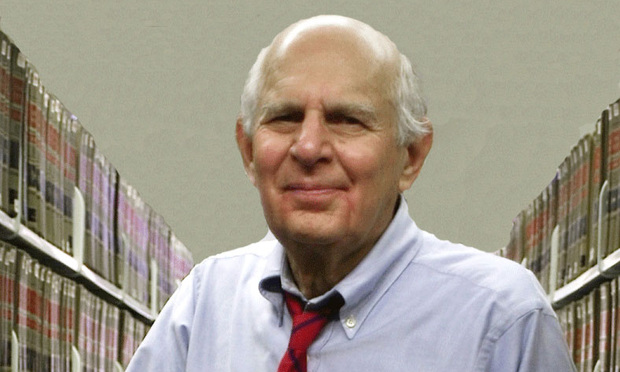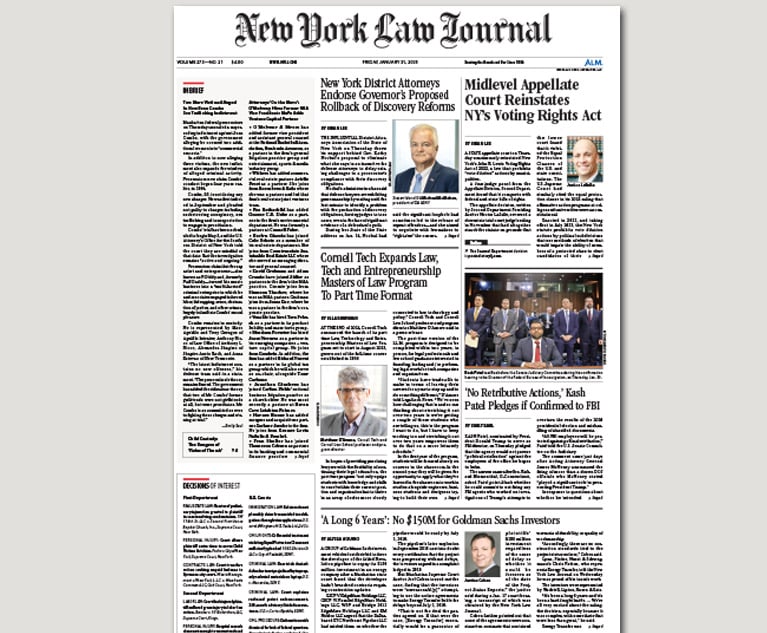Increased Charitable Tax Incentives—The CARES Act
In his Estate Planning and Philanthropy column, Conrad Teitell discusses how non-itemizers (those taking the standard deduction) may deduct up to $300 of cash gifts to publicly supported charities (other than Donor Advised Funds and Supporting Organizations) in 2020.
June 19, 2020 at 11:40 AM
3 minute read
 Conrad Teitell
Conrad Teitell
Non-itemizers (those taking the standard deduction) may deduct up to $300 of cash gifts to publicly supported charities (other than Donor Advised Funds and Supporting Organizations). This is for 2020 only.
Tax "experts" disagreed whether $600 could be deducted on a joint return. And the answer is: only up to $300 on a joint return. The staff of the Congressional Joint Committee on Taxation in its 108-page "Description of the Tax Provisions of the CARES Act" (page 21, footnote 76) states the deduction is limited to $300 on a joint return. The staff reports are often described as "The Blue Book." Back in the dark ages, the printed copies had blue covers; hence the name.
Is the Blue Book "authority"? Not according to the U.S. Supreme Court in United States v. Woods, 134 S. CT. 557, 568 (2013): "… the Blue Book, like a law review article, may be relevant to the extent it is persuasive."
What should your clients do? I don't give advice in this column. So all I'll say is every client is entitled to his or her decade in court—and it's a long way to certiorari.
Itemizers' Charitable Deduction Ceiling for 2020 Cash Gifts Increased to 100 Percent of AGI:
- Qualifying charities are public charities except Donor Advised Funds (DAFs) and Supporting Organizations. This increase to 100% of AGI is up from 60 percent of AGI. And it's for 2020 only.
- Existing wrinkle. Starting in 2018, the AGI ceiling for cash gifts is 60 percent of AGI (up from 50 percent of AGI). However, due to a drafting error, many believe the 60 percent (instead of the previous 50 percent) of AGI ceiling applies if the donor makes only cash gifts in the year. But this issue doesn't apply in 2020. Thus, the deductibility ceiling for cash gifts in 2020 is 100 percent of AGI even though the donor makes non-cash gifts in 2020.
- Cash gifts made before 2020 and being carried over to 2020 don't qualify for the 100 percent of AGI ceiling. To qualify for the unlimited 100 percent of AGI cash-gift deductibility ceiling, the gifts must be made in 2020.
- For cash gifts exceeding 100 percent of AGI in 2020, the "excess" can be carried over to subsequent years. But the earlier percentage of AGI limits will apply.
- Presumably, IRS will issue guidance on how to claim the 100 percent of AGI deductibility ceiling.
Corporate Cash Gifts In 2020. The charitable deduction ceiling is increased from 10% to 25% of taxable income. CARES Act (Pub. L.116-136, §2205(a)(2)(B)). The increased ceiling must be elected. Presumably, IRS will issue guidance.
And that dear readers, is the news from Lake Taxbegone.
Conrad Teitell is a principal at Cummings & Lockwood in Stamford, Conn.
This content has been archived. It is available through our partners, LexisNexis® and Bloomberg Law.
To view this content, please continue to their sites.
Not a Lexis Subscriber?
Subscribe Now
Not a Bloomberg Law Subscriber?
Subscribe Now
NOT FOR REPRINT
© 2025 ALM Global, LLC, All Rights Reserved. Request academic re-use from www.copyright.com. All other uses, submit a request to [email protected]. For more information visit Asset & Logo Licensing.
You Might Like
View All
Law Firms Expand Scope of Immigration Expertise Amid Blitz of Trump Orders
6 minute read

Orrick Hires Longtime Weil Partner as New Head of Antitrust Litigation
Law Firms Mentioned
Trending Stories
- 1Uber Files RICO Suit Against Plaintiff-Side Firms Alleging Fraudulent Injury Claims
- 2The Law Firm Disrupted: Scrutinizing the Elephant More Than the Mouse
- 3Inherent Diminished Value Damages Unavailable to 3rd-Party Claimants, Court Says
- 4Pa. Defense Firm Sued by Client Over Ex-Eagles Player's $43.5M Med Mal Win
- 5Losses Mount at Morris Manning, but Departing Ex-Chair Stays Bullish About His Old Firm's Future
Who Got The Work
J. Brugh Lower of Gibbons has entered an appearance for industrial equipment supplier Devco Corporation in a pending trademark infringement lawsuit. The suit, accusing the defendant of selling knock-off Graco products, was filed Dec. 18 in New Jersey District Court by Rivkin Radler on behalf of Graco Inc. and Graco Minnesota. The case, assigned to U.S. District Judge Zahid N. Quraishi, is 3:24-cv-11294, Graco Inc. et al v. Devco Corporation.
Who Got The Work
Rebecca Maller-Stein and Kent A. Yalowitz of Arnold & Porter Kaye Scholer have entered their appearances for Hanaco Venture Capital and its executives, Lior Prosor and David Frankel, in a pending securities lawsuit. The action, filed on Dec. 24 in New York Southern District Court by Zell, Aron & Co. on behalf of Goldeneye Advisors, accuses the defendants of negligently and fraudulently managing the plaintiff's $1 million investment. The case, assigned to U.S. District Judge Vernon S. Broderick, is 1:24-cv-09918, Goldeneye Advisors, LLC v. Hanaco Venture Capital, Ltd. et al.
Who Got The Work
Attorneys from A&O Shearman has stepped in as defense counsel for Toronto-Dominion Bank and other defendants in a pending securities class action. The suit, filed Dec. 11 in New York Southern District Court by Bleichmar Fonti & Auld, accuses the defendants of concealing the bank's 'pervasive' deficiencies in regards to its compliance with the Bank Secrecy Act and the quality of its anti-money laundering controls. The case, assigned to U.S. District Judge Arun Subramanian, is 1:24-cv-09445, Gonzalez v. The Toronto-Dominion Bank et al.
Who Got The Work
Crown Castle International, a Pennsylvania company providing shared communications infrastructure, has turned to Luke D. Wolf of Gordon Rees Scully Mansukhani to fend off a pending breach-of-contract lawsuit. The court action, filed Nov. 25 in Michigan Eastern District Court by Hooper Hathaway PC on behalf of The Town Residences LLC, accuses Crown Castle of failing to transfer approximately $30,000 in utility payments from T-Mobile in breach of a roof-top lease and assignment agreement. The case, assigned to U.S. District Judge Susan K. Declercq, is 2:24-cv-13131, The Town Residences LLC v. T-Mobile US, Inc. et al.
Who Got The Work
Wilfred P. Coronato and Daniel M. Schwartz of McCarter & English have stepped in as defense counsel to Electrolux Home Products Inc. in a pending product liability lawsuit. The court action, filed Nov. 26 in New York Eastern District Court by Poulos Lopiccolo PC and Nagel Rice LLP on behalf of David Stern, alleges that the defendant's refrigerators’ drawers and shelving repeatedly break and fall apart within months after purchase. The case, assigned to U.S. District Judge Joan M. Azrack, is 2:24-cv-08204, Stern v. Electrolux Home Products, Inc.
Featured Firms
Law Offices of Gary Martin Hays & Associates, P.C.
(470) 294-1674
Law Offices of Mark E. Salomone
(857) 444-6468
Smith & Hassler
(713) 739-1250







